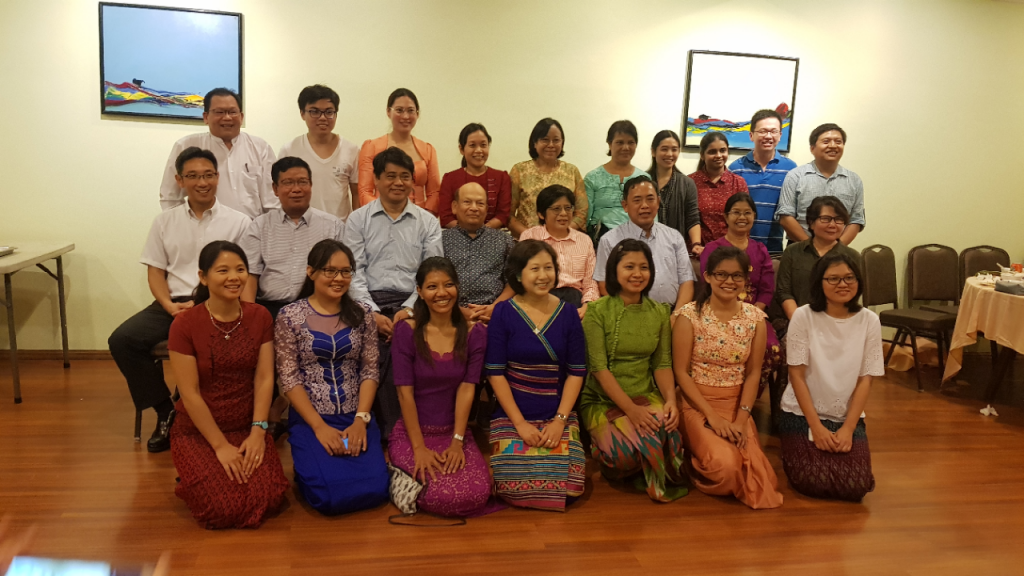The NUCOT Diaspora in Myanmar

Prof Vathsala (2nd row, 4th from left) and A/Prof Tiong (2nd row, first from right) with Yangon nephrologists and urologists in May 2019
Dr Tan Yi Quan and Assoc Prof Tiong Ho Yee from the Department of Urology trace how the National University Centre for Organ Transplantation (NUCOT) started its efforts to lead medical education. They also outline the ways in which the faculty lend their expertise to emerging countries and created the NUCOT Diaspora in Myanmar.
by Dr Tan Yi Quan and Associate Professor Tiong Ho Yee
Department of Urology, University Surgical Cluster, National University Health System
The International Society of Nephrology (ISN) Sister Renal Centres Programme (SRC) is dedicated to addressing the disparity between developing and developed countries in the research, diagnosis, treatment, and prevention of kidney disease. The National University Centre for Organ Transplantation (NUCOT) has been actively involved in the ISN SRC, developing renal transplant capabilities for both Adult and Paediatric transplant programmes at multiple renal centres in Myanmar.
As part of NUCOT’s aspirations to develop into a regional centre of transplant excellence, Professor A. Vathsala, Co-Director of the National University Centre for Organ Transplantation at the National University Health System initiated NUCOT’s participation in the ISN SRC as a matured academic medical centre in 2012. Funding from the SRC enabled NUCOT to nurture a partnership between NUH and the Thingangyun Sanpya General Hospital (TSGH), a 430-bed public hospital in Yangon, Myanmar. In 2012, NUCOT and TSGH were introduced to the ISN SRC Programme by the Ministry of Health (MOH) and in 2013, NUCOT and TSGH were officially recognised as a Sister Renal Centre Pair by ISN. Since the start of the programme, 27 TSGH doctors and nurses have visited NUH to: firstly, build capability through training; secondly, expose the TSGH team to multidisciplinary patient care, and thirdly, understand the operating theatre infrastructure set-up and protocols.
Prof Vathsala and A/Prof Tiong Ho Yee also visited TSGH to share expert advice on optimising ward and operating theatre protocols for adult kidney transplantation. Following that, an exchange visit of the TSGH clinical team to NUH NUCOT was successfully carried out in late 2017 with attendance to clinics, operating theatres and transplant coordinator training courses. There are three levels of support under the ISN SRC Programme, each level delineating the progress of the partnership, the funding scope and benefits. NUCOT has also been accorded the highest possible status (Level A), one of the few transplant centres internationally to be awarded this accolade. With close collaboration between the two centres, Prof Vathsala and A/Prof Tiong successfully enabled the local team to perform adult kidney transplantations in April 2019 at TSGH.
The Shaw-NKF-NUH Children’s Kidney Centre has been the ISN Sister Renal Centre to Yangon Children’s Hospital’s Renal Unit since 2015. Led by Prof Yap Hui Kim, Head & Senior Consultant, Division of Paediatric Nephrology, Dialysis and Renal Transplantation, Department of Paediatrics, Khoo Teck Puat-National University Children’s Medical Institute, National University Hospital, the NUH team has conducted multiple dialysis workshops in haemodialysis and peritoneal dialysis. Burmese paediatric nephrologists were trained in NUH as clinical fellows under the International Paediatric Nephrology Association Programme. In 2017, the ISN SRC programme was expanded to include a second centre, the Mandalay Children’s Hospital.
With the success of the chronic dialysis programmes, another problem arose – there was no Paediatric renal transplant programme. Haemodialysis-dependent children had to stay in the main city hospitals together with their caregivers, and were unable to return home. To address this critical need, Prof Yap and Prof K. Prabhakaran, Emeritus Consultant, Department of Paediatric Surgery, Khoo Teck Puat-National University Children’s Medical Institute, National University Hospital, started the Paediatric Transplant programme in Myanmar.

Prof Prabhakaran (2nd row, 4th from left), Prof Yap (2nd row, 5th from left), A/Prof Tiong (2nd row, 1st from left) and Dr Tan (3rd row, 2nd from right) with Mandalay paediatric nephrologists, paediatricians, paediatric surgeons, anaesthetists and nurses in May 2019
The first living-related kidney transplant was conducted successfully on 24 Feb 2017 in Mandalay Children’s Hospital. The initial NUH team included a paediatric nephrologist, paediatric transplant surgeon, adult urologist, vascular surgeon, paediatric radiologist and a paediatric anaesthetist. Since then, deliberate efforts at expertise and skills transfer have allowed the local transplant team to operate with increasing levels of autonomy.
The most recent trip in May 2019 saw an adult urologist and a paediatric transplant surgeon operating alongside the local transplant team. There has been a total of 10 paediatric kidney transplants in Myanmar, with the children returning back to school and achieving catch-up growth. The eventual goal is for the local transplant team to perform transplants independently, with the NUH team assisting in difficult cases.
NUH NUCOT is the only transplant centre in Singapore providing both paediatric and adult organ transplant services. By taking the lead in medical education and expertise transfer to emerging countries like Myanmar, NUH NUCOT is well poised to contribute significantly to the regional healthcare landscape.
A/Prof Tiong and Dr Tan were part of the NUCOT team that conducted the 9th and 10th living-related paediatric kidney transplants at the Mandalay Children’s Hospital, Myanmar in May 2019. Dr Tan travelled to Myanmar under the Fung Clinical Fellowship Programme. Established by the Victor and William Fung Foundation and in collaboration with NUHS, the Fellowship enables the NUS Yong Loo Lin School of Medicine to aid disadvantaged populations in ASEAN countries and in China. The Fellowship supports both outbound local expert faculties and inbound doctors from the region, enabling Singapore to partner our regional neighbours, extending support and expanding influence. This Fellowship will also allow future inbound fellows from Myanmar to train in NUH, to sustain a long-term mutually beneficial partnership.
